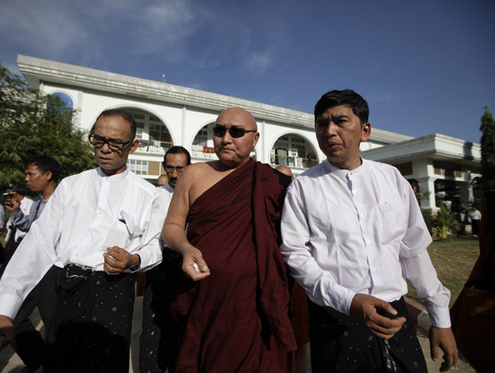To mark the 26th anniversary of Burma’s democratic uprising on 8 August 1988, Min Ko Naing, head of the 88 Generation Peace and Open Society (88GPOS), spoke with DVB’s Aye Nai about the progress made and the path towards establishing a true federalist system under civilian rule.
Min Ko Naing explained the core values of the 88-generation movement, and urged Burma’s workforce to remain united in their efforts to secure a peaceful, stable and democratic future.
Q: What were the core values of the 88 movement?
A: We were fighting against a one-party dictatorial system. People fought against a few taking special privileges and suppressing all others. That was the core of the movement. Though the movement was led by students, students alone could not bring about all of the changes we sought; general public participation was important. The key successes of the movement were because of the work of ordinary people. We should always remember the goodness of unsung heroes who gave their lives, and those who are left should carry on to pursue their goals. We faced brutal responses, but people marched on. I want this to remain in history as unforgettable.
Q: Twenty-six years of rule by the Burma Socialist Programme Party ended in 1988, but the military remained in charge for another 26 years. What tactics or strategies do you think are needed to achieve truly civilian control in Burma?
A: The one-party system is like the bark of a tree; only the skin was removed. The stem was still there. We need to remove the core. As we all know, we have not achieved that goal. When we think about our needs, we also need to think about our strengths and weaknesses. The main weakness, I think, is that we couldn’t march together, united. What I mean is that there are political parties, monks, ethnic forces — both armed and unarmed — and then there are the people. We need unity among those political forces if we are serious about about achieving democracy.
[related]
We are facing division among the monks today. We need to reorganise the Sangha.
Then there are the ethnic forces. Ethnic groups want ethnic equality. The goal is to establish a federal union.
As for tactics, we all agree that we can’t accept the current Constitution. We need to amend it. There are also disputes over whether we should amend or rewrite it. What I think is that whether you change one line or the whole document, it is amendment. The point of changing the constitution is changing article 436. That is the main gate to changing the Constitution; if it is opened, we can make other changes. We should all focus on that.
As for the ethnic peoples’ goal of establishing a federal union and reaching a ceasefire, everyone needs to participate. Participation requires awareness. In summary, people need to become aware, and then they need to participate in change. All of those people who want to move beyond military rule and establish a democratic federal union, they should then work in harmony.
Q: How similar are the current demands of the people to those we saw during the 1988 uprising?
A: People want a real democracy. We can accept that the generals changed their costumes and became civilians, but they should only assume power if they do it the right way. There are major obstacles in the different levels of administration; we have ex-military representatives in power without being elected. That is not democracy, and we cannot accept it as democracy.
They also need to realise that they cannot hold power for eternity, and that one day they will need to give it up.
Q: As a former student leader, what do you think of the current ceasefire preparations and the peace process in general?
A: There have been many ceasefires in the past, but this ceasefire should aim for lasting peace. It should be a temporary solution for an urgent problem that will lead to a lasting settlement. This is the most important goal. Following the signing of a ceasefire, there will be political discussions. There is, however, still a problem of representation. It’s not enough to have an agreement among military leaders from both sides, the representation should be more extensive. On the ethnic side, there should be full representation of ethnic peoples. On the military side, the generals should not have exclusive decision-making power.
Secondly, the process should be transparent. We’ve seen pictures from ceasefire agreements in the past — both sides shaking hands. Then the ceasefire would be suddenly broken. We didn’t know why it was broken, who violated the agreement first. We didn’t know what the agreements really meant. There was no transparency. We need transparency, and it needs to be reinforced by watchdogs. There should be forces who act as overseers so that we will understand the agreement and know who broke it, if it is broken.
In short, the peace process should have extensive representation and it should be transparent. I like to think of it as a Union Conference. It should be inclusive for all.



